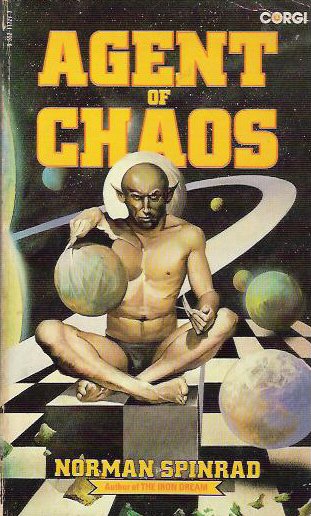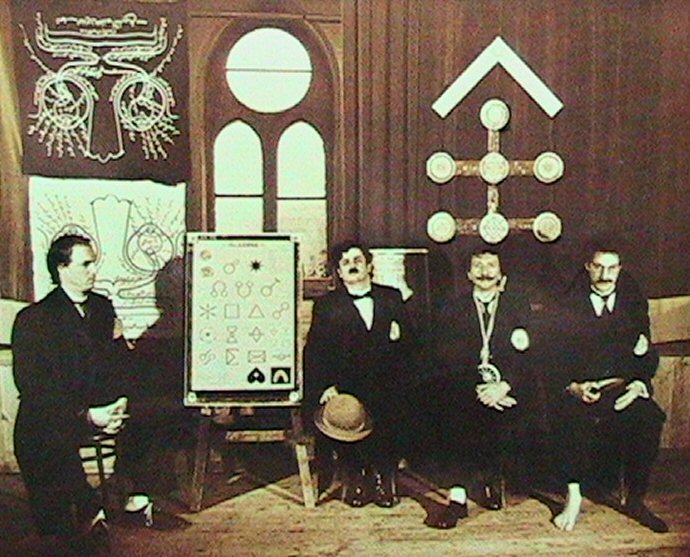I looked out of the window, and in the moonlight I saw a man with a grey untidy beard standing next to the hen house. For a moment, I thought it was the Archbishop of Canterbury, but I blinked and rubbed my eyes and looked more attentively and saw that it was not. Stupid me. Why on earth would the head of the Anglican church be standing next to my hen house in the middle of the night? But then, why would anyone be standing there, bearded, motionless, hands in pockets, silent?
I pulled on a pair of stylish Pierre Mépris trousers and a boxy Funkster jacket over my pyjamas and crept down the stairs. They creaked, but then wood always creaks in the night, for reasons to do with moisture and air and shrinkage which I barely understand. Before slipping my feet into a pair of ticketyboo winklepickers, I paused in the darkened parlour, took the lid off the tank, and sprinkled some food for Dan and Googoo and Penfold and Hobbes. They are my foursome of terrapins. They do not usually get fed at night, and I cannot explain why I fed them now, but I did, I did, as the evidence shows. I think you will find the relevant passage in Bundle Four.
Unlatching the back door, as quietly as I could, I felt in my jacket pocket for a weapon. The man with the beard could be benign, but equally he might mean me harm, and I wanted to be able to protect myself. As I hoped, there was a sap in my pocket. Ordinarily I used it to thump nothing bigger than a squirrel, but I knew that its previous owner, a copper, had stunned many a malefactor caught red-handed in the prosecution of a crime.
My heart was beating unnaturally fast, so before swinging the door open, I turned back into the kitchenette and filled a beaker with water from the cold tap, to wash down a couple of pills I took from a bottle in a drawer. They were Dr Baxter’s Calmative Preparation Tablets. I swear by them. Passing the parlour door, I saw out of the corner of my eye that I had neglected to replace the lid on the terrapin tank. Hurriedly, I made good this omission, but not before counting the terrapins to ensure all four were present and correct. They were. Penfold looked a bit peaky, and I resolved to observe him carefully over the next few days. I thought, you see, that I would have those days to fritter.
Approaching the now unlatched back door again, I pondered whether the wearing of a hat would be advisable. The bearded man by the hen house was bareheaded, I had noticed, but that did not mean I too should go hatless. I turned to my rack of hat hooks and plucked, more or less at random, a Chepstow titfer, battered with age but perfectly moulded to my rather peculiarly shaped head. I have always had trouble buying hats. Oddly, this one I had obtained secondhand, from a used hat shop. Lord alone knew how old it was, or how many heads it had adorned before mine.
I opened the back door and stepped out into the night. The moon had vanished behind a cloud and it was darker than I expected. I peered towards the hen house and saw the silhouette of the man with the beard. So far as I could tell, he had not moved a muscle since I watched him from my window. I wondered if it would be a good idea to rush at him across the lawn, fell him by a bash on the head with the sap, and ask questions later. That, I recalled, had been the copper’s technique. But then it occurred to me that Jellicoe, my peasant helpmeet, had been toiling in the grounds the previous evening, and he would likely have left a rake or a spade lying about, obscured in the gloom, over which I might stumble and fall, thus giving the beardy man an advantage. Jellicoe is a tireless and diligent worker, but he has slapdash ways. On the other hand, he knows more about potatoes than any man alive. But that is by the by.
Without taking a step forward, I decided to call out to my mysterious nighttime visitor.
“Ahoy there, man with beard!” I cried, “Why stand you there loitering next to my hen house in the night?”
There was no reply, save for the rustling of a small nocturnal mammal somewhere in the hedge and, distantly, the hoot of an owl. After a few seconds, I repeated my enquiry, slightly louder and changing the word order. Again, nothing. The man with the beard, still only visible to me as a looming shape against the hen house wall, remained utterly still and silent. I judged that he was an inch or two taller than me, and bulkier, though the latter might be accounted for if he was wearing, say, a B De Groot overcoat or similar padded winterwear. I had a B De Groot myself, and thought I ought to have donned it instead of the Funkster, but then I remembered it was at the dry cleaner’s. Jellicoe had spilled some sort of horticultural fluid on it when I loaned it to him, one freezing day, out of the goodness of my heart.
Still unsure who, or what, I was dealing with, I took the sap out of my pocket, ready to strike if need be. Its weight was reassuring. Then the moon emerged from behind the clouds as they scudded westward in the night, and I was able to see the bearded man more clearly. His beard was indeed untidy and grey, almost white, and he did in fact bear a distinct resemblance to the Archbishop of Canterbury, though he was unbespectacled. Spectacles would have been of no use to him, for I saw now, in the light afforded by the moon, that his eyes were milky white and sightless. He was a blind man with a beard. He had neither stick nor dog to guide him. Acting on impulse, I shouted.
“If you have come to steal my hens, sir, you are on an errand to nothing, for the hen house is empty!”
This was a barefaced lie. There were plenty of hens in the hen house, but I could guarantee they were all away with whatever fairies haunt the dreams of hens, for Jellicoe had taken to lacing their feed with ground-up Dr Baxter’s Tablets. Still there was no response from the bearded man. Picking my way carefully across the lawn, I walked towards him, the sap in my fist. Now at last I provoked a reaction. He span around, turning his back to me, and then, unaccountably, he began to run, even to sprint, off across Jellicoe’s potato beds. How could a blind man go so fast? It was then I made a terrible, terrible mistake. I set off in pursuit of him.
I was surprised how easily my ageing creaky bones sped over the ground. I felt as if I were running on air. Usually when I run, for example to catch a bus or to waylay a squirrel, I develop an instant stitch and I pant and drool. Not now. I even managed to keep my hat on my head instead of it flying off, as it tends to do when I build up speed, in spite of its fit.
Before long we were running, the blind man and I, through country I did not know. The vegetation grew wilder, and unfamiliar, and oddly lascivious. Birds of the night flew past my head, enormous, and shrieking. The air became somehow thick and damp and fumous. And on we ran, the blind man always just ahead of me. I could not catch him.
In this night that has lasted years, I am beginning to realise that I never will. Yet I am impelled forward, ever forward, over strange new ground, in the moonlight, in pursuit of a blind and bearded man I know now was sent to summon me, for a purpose I may yet discover, if ever we reach the edge of the world. And in the meantime, there are the Bundles, dozens of them, on the table in the parlour, next to the terrapin tank, in which every detail of my life is writ, and writ in Braille.


